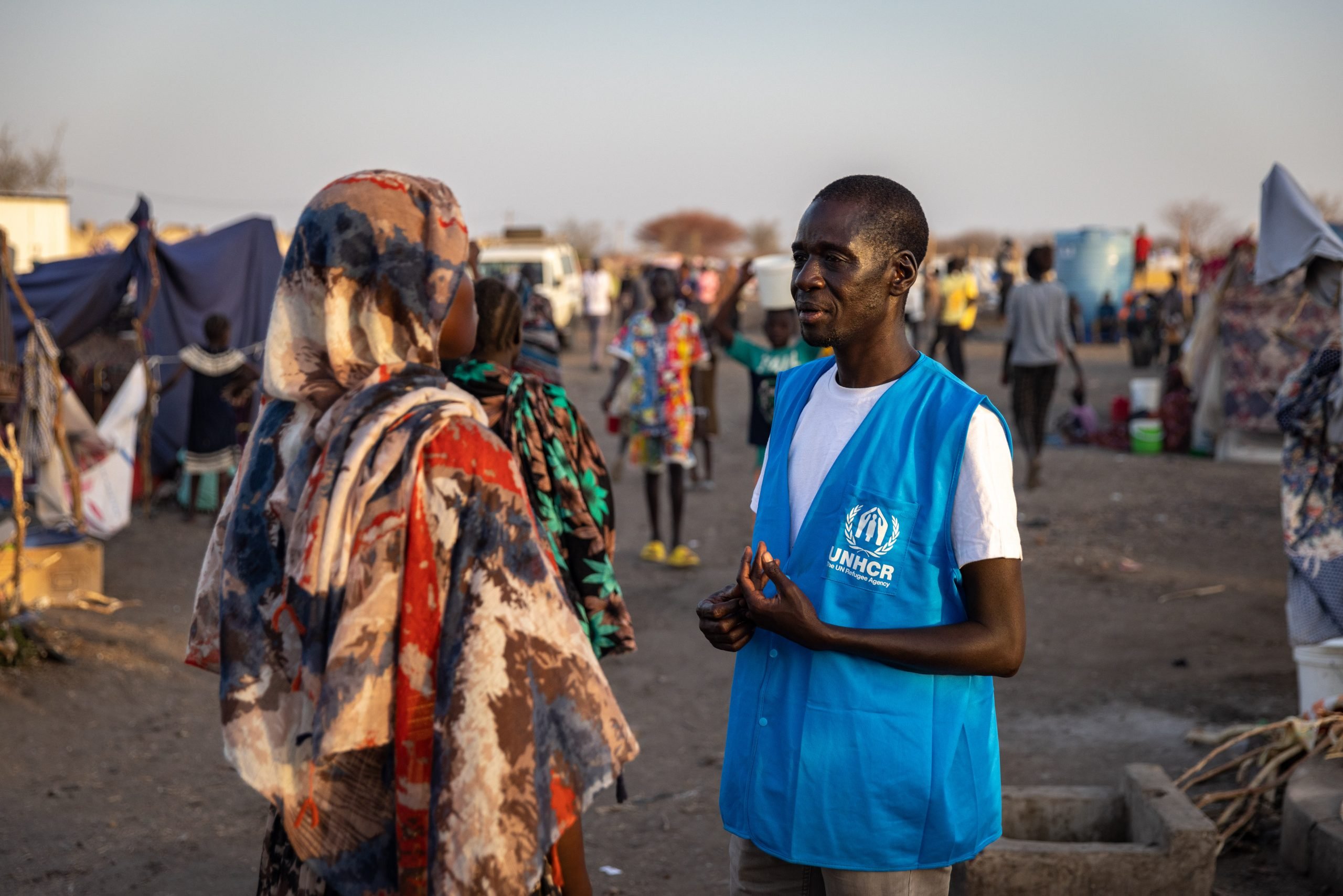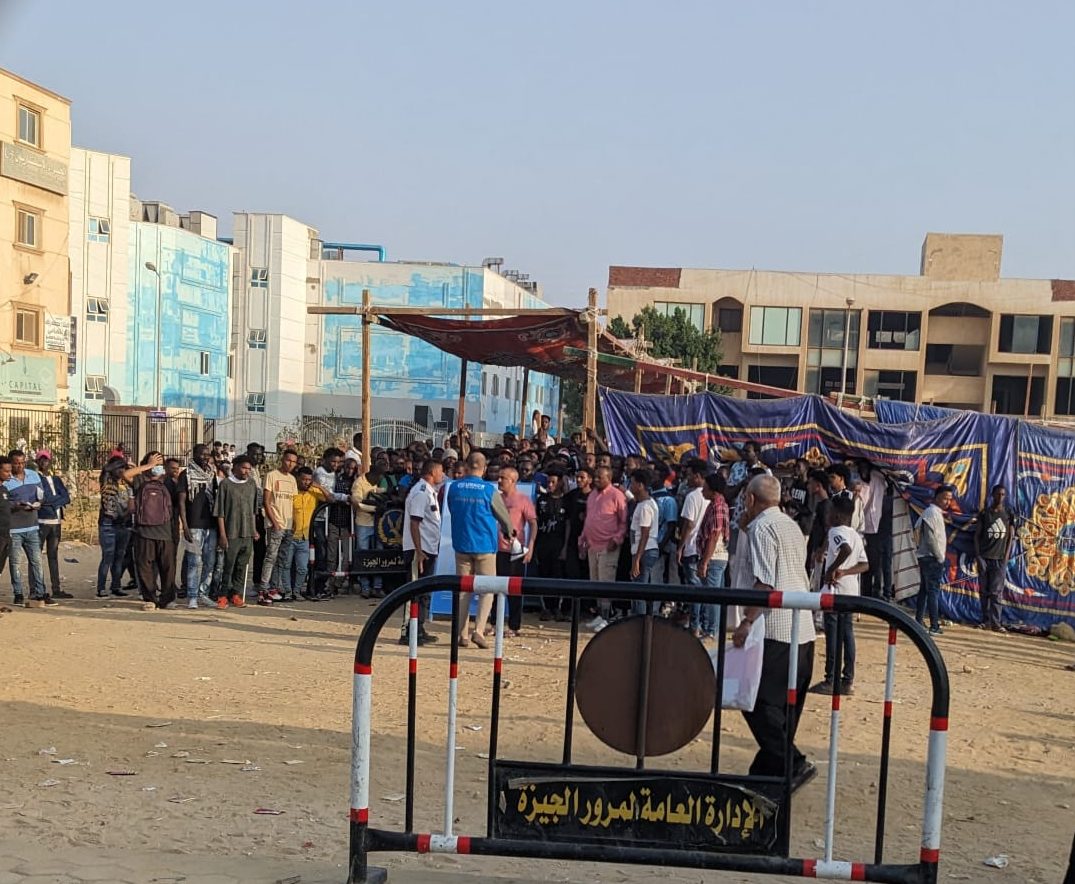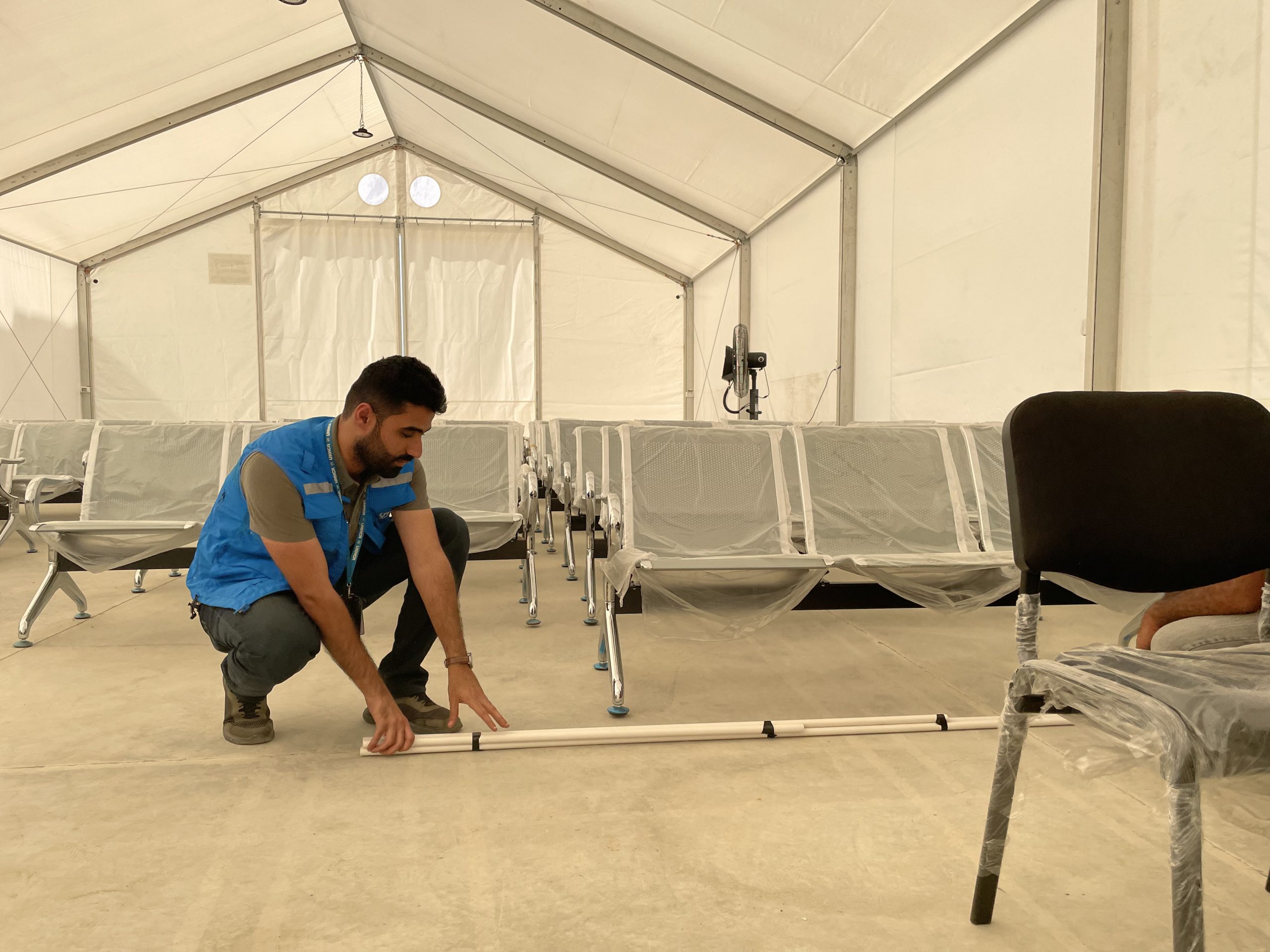
UNHCR Protection Officer Loku James meets with people at the UNHCR transit centre in Renk, South Sudan. The centre, which has now reached its capacity of 5,000, is providing access to water, food and medicine for many South Sudanese returnees fleeing the conflict in Sudan. © UNHCR/Andrew McConnell
When the armed conflict in Sudan broke out in mid-April 2023, UNHCR conducted the last stages of its revamped Emergency Registration Learning Programme (ERLP). 20 staff from various locations across the world were trained in refugee registration and identity management in emergencies, enabling them to develop and implement efficient and strategic registration processes for emergency situations. After successfully completing the training, these colleagues were included in UNHCR’s emergency registration roster and can be deployed within 72 hours when the need arises.
And deployment quickly became reality for some colleagues as the situation in Sudan only worsened. While the country used to be home for the second highest refugee population in Africa, the renewed conflict has now displaced over 800,000 people inside Sudan. By the end of 2023, over 1.8 million people are expected to arrive in the five neighbouring countries Egypt, South Sudan, Central African Republic, Chad, and Ethiopia.
Yazen Alsalaheen, Ben Zihalirwa Nyamoga and Ari Habeeb Ahmed are UNHCR colleagues who completed the ERLP in April and were deployed by June. What were their experiences from the training to deployment?
Keeping calm

On his very first day, Yazen Alslaheen was asked to organize a group of roughly 1300 newly arrived refugees in Cairo. He took the megaphone and went to work. © Ari Habeeb Ahmed
Yazen is Associate Registration Officer in Jordan. With almost a decade of registration experience under his belt, he decided to apply for the ERLP as it “is a once in a lifetime experience that helps you discover your professional skills and characteristics in addition to who you are as an individual.”
In June, he was notified and deployed to Egypt within five days to support the ongoing emergency registration efforts of the country’s two largest cities Cairo and Alexandria with the influx of refugees from Sudan.
Yazen highlights the different contexts in which UNHCR registers people forced to flee. While refugee registration in Jordan is almost ‘business-as-usual’ after eleven years, Egypt is currently witnessing a new and massive influx of refugees. Yazen’s role is to very quickly increase registration capacity related to both facilities and structures as well as staff in Cairo’s and Alexandria’s field offices. The aim is to capacitate the team to register up to 115,000 persons forced to flee by the end of the year. “It’s a lot of reverse-engineering and teamwork to make this happen”, according to Yazen.
For him, the ERLP taught him new ways to look at registration processes. “Remaining calm, adapting to stress and dealing with challenges in a way that does not stress people around you, is very important in an emergency context”, Yazen explains one of the teachings of the ERLP. Through role play, the ERLP students learned to deal effectively in stressful situations when, for example, refugees, stakeholders, and the Representative require your support at the same time.
Ready to face any situation
Ben Zihalirwa Nyamoga, Associate Operation Data Management Officer in Nairobi, Kenya, was deployed to Aweil in South Sudan, close to the border with Sudan. With no UNHCR office presence, he describes the situation as: “Everyone is looking at you to provide numbers, elaborate a registration strategy and advise on what is needed for the operation in terms of registration and documentation. I had to built everything from scratch.”
And not only that. Because of the initial lack of staff, he was involved in and helped with a whole range of tasks. Between “referring sick refugees to the Médecins Sans Frontières health center and sometimes even carrying them to the referral hospital in Aweil Town or generating a distribution list and sharing it with the World Food Programme on a daily basis”, it was the ERLP which readied him to face any situation in an emergency. “With this programme, I acquired so much knowledge in terms of registration in emergency situations; I think now I am ready to face any emergency in the future.”
Asked about what he learned from the ERLP, he replied: “In Aweil, I was the one constituting a team from scratch, and I wouldn’t have done it without the training I received. The ERLP was really very important.”

Ben Zihalirwa Nyamoga helped set up the distribution of core relief items to refugees in South Sudan, fleeing renewed violence in Sudan. © Ben Zihalirwa Nyamoga
Teamwork is essential

One of Ari Habeeb Ahmed’s tasks was to help set up a newly constructed Rubb Hall at UNHCR Registration Centre in Cairo. Final preparations and network testing are carried out before utilizing the space for registration activities. © UNHCR/Ahmed Abdelkader
Like Yazen, Ari Habeeb Ahmed was also deployed in Cairo, Egypt, to support the emergency resulting from the Sudan situation, which has been classified as the most severe among humanitarian organisations (Level 3). He highlights the challenges and expectations that come with the staff scale-up that is currently needed in Egypt to respond effectively to the emergency.
Ari led the recruitment of 77 registration colleagues and, together with three others, he interviewed nearly 100 persons in one day. He says: “I was impressed by the highly competitive pool of candidates, especially considering the large number of positions and applicants. Usually, we struggle to find highly competent and capacitated applicants for large staff recruitment during emergencies. However, many of the applicants are fresh graduates who were motivated to be part of the team and respond to the urgent protection needs of the new arrivals from Sudan.”
For Ari, teamwork is the essential part when responding to an emergency. One of the main lessons, he draws from his deployment is the need and benefits of keeping the whole team updated and involved: “This is key to shaping better brainstorming and inventing more efficient ideas related to change management and overcoming obstacles.”
The ERLP prepared him well for the deployment experience as Ari wanted to explore registration in an emergency context: “I consider it as an opportunity to enrich my experience in the international protection, registration, and identity management – build and develop skills and learn how to explore innovative solutions when being part of an emergency response team.”
Experience of a lifetime
Thanks to the recently revamped ERLP, UNHCR has a roster of highly trained and prepared colleagues to deploy to emergencies, who can set up and lead the essential registration of forcibly displaced populations. Not only is the ERLP a once-in-a-lifetime opportunity, but it also equips participants to feeling “truly well-equipped with information that I can utilize during the deployment”, as highlighted by Ari. Being ready to face any situation and teamwork are the two main ingredients for success, when deployed. Providing protection and solutions for people forced to flee can be strenuous and hard work at times. However, everyone needs and deserves protection. The ERLP contributes to this mandate of UNHCR.
